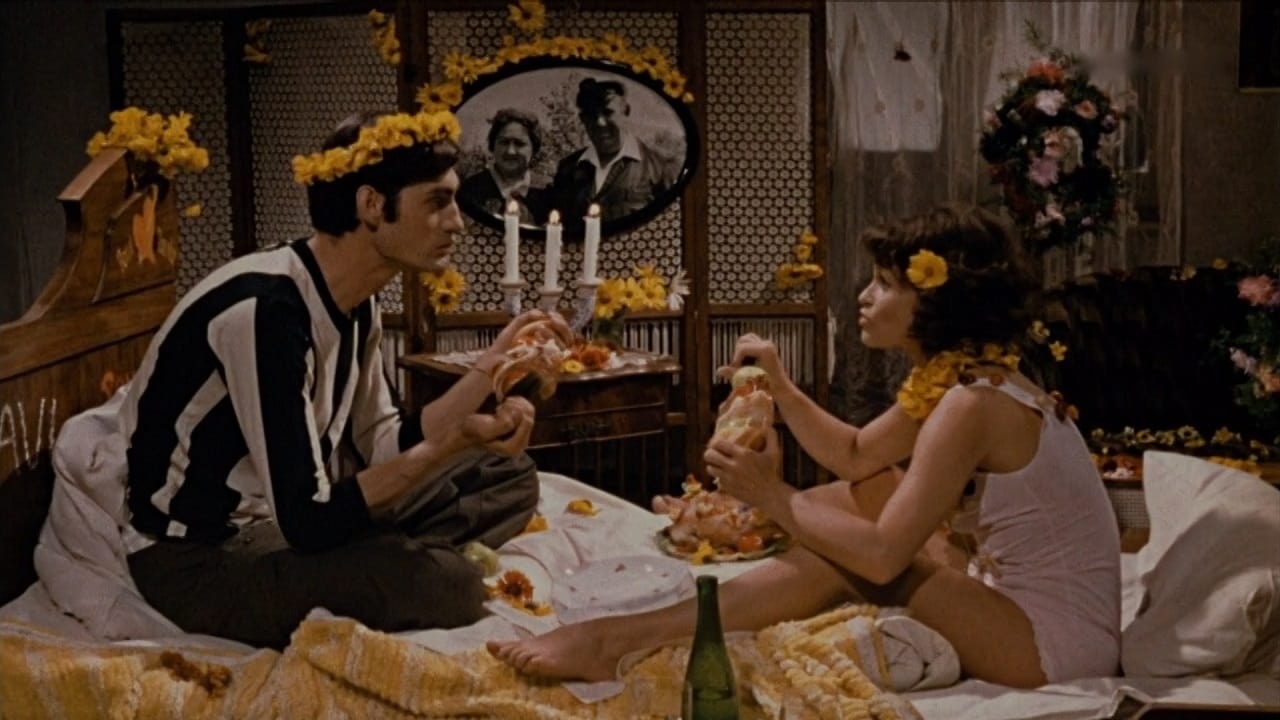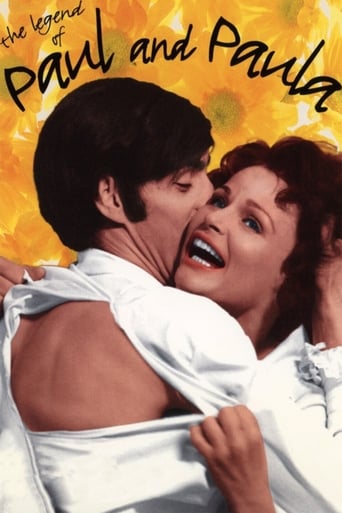

An absolute waste of money
... View MoreThe performances transcend the film's tropes, grounding it in characters that feel more complete than this subgenre often produces.
... View MoreThe film was still a fun one that will make you laugh and have you leaving the theater feeling like you just stole something valuable and got away with it.
... View MoreI am only giving this movie a 1 for the great cast, though I can't imagine what any of them were thinking. This movie was horrible
... View MoreThe film "Die Legende von Paul und Paula" is the answer of DEFA to the western Flower Power movement in the sixties. And although normally the Bolshevist film makers have a habit of ridiculing western (bourgeois) cultural phenomena, in this film they look kindly upon the sensual life of the hippies. The result is a bitter-sweet story. Bitter, because Flower Power is a counter culture, that revolts against the powers that be. The relation between the young lovers Paula and Paul is passionate and bold. For Paul is still married, albeit with a pawky and deceitful woman, a pauper and a pouter, in an affair that from the start never had a chance. And Paula is a mother of two children, just separated, because her husband could not remain faithful. Evidently marriage can be a vexation. The relation between Paula and Paul develops on feelings of passion and attraction. For on the level of cognition they are very different. Paul is a well-paid worker in the medical profession, and looks forward to a brilliant career. Paula works as check-out lady in a supermarket (does this mean something?). Some would call her a Paul Pry. But she possesses a fantasy, a despairing joy and a cheerful nature, that gradually undermine Pauls narrow-minded objections against a new steady relationship. There is sorrow too, for instance when Paulas little boy is killed in a road accident. Finally, after much amorous pow-pow, in the end the couple is united. But the union will not last. For Paula insists on having a child from Paul, even though because of physical inaptness the birth will most likely kill her. She is passionate until the end. Her death is the rebirth of Paul, who now under his own power adopts her sensual and joyous life style (with three kids, two from their former marriages, plus the mutual one). The timeless freedom of their affair is supported by the music of the GDR rock band "Die Puhdys", and by psychedelic scenes of Paula and Paul in a bed of flowers, floating on a river. The contrast with an earlier scene, where they make love in a pound, is immense. Of course this film is not unique. It follows the typical pattern of those days, just like for instance the Dutch film "Turks fruit" (also ending with the death of the female), and the American "Hair". But although I grew up in those years, I am still unable to give a convincing interpretation. There is something about sexual liberation and ill-fated relations. Beyond that, the behavior of the main characters is clearly unhealthy - just like Flower Power itself was unworldly and not viable. Perhaps the message is that there is always hope, and you should smile even in times of humanitarian shortcomings. We are just pawns in life's game. Let us call it a kind-hearted film with many qualities, that deserves more than it gets - like often on IMDb.
... View More"Die Legende von Paul und Paula" (1973), co-written and directed by Heiner Carow, is a famous film in Germany. The story seems tame enough now--a young woman is dissatisfied with her life and takes active steps to improve it.Angelica Domröse plays Paula, a single mother who has a dead-end job and no social life. Winfried Glatzeder portrays Paul, who is unhappily married and is drawn to the free-spirited Paula. (Glatzeder has been called East Germany's Jean-Paul Belmondo. He didn't look much like Belmondo, and wouldn't have struck me as leading man material. However, I don't know enough about East German cinema to be aware of his competition.)I've been told that the reason for this film's popularity in East Germany was because it contained subtle criticism of the regime, as well as depicting some PG-13 sex. I know East German films were subject to strict censorship, and, as in any similar regime, directors inserted criticisms in ways that were necessarily very indirect and symbolic.The problem is that this movie only works if you can think of how you would have viewed it in East Berlin in 1973. I don't believe it's strong enough to succeed on its own merits in 2006.
... View MoreIt's kind of weird. Angelica Domröse speaks in the movie of a Banana and why it's bent, yet she as an actress has probably never seen one. Also her parents most likely chose her name 'Angelica' (note: the name is spelt 'Angelika' in any German-speaking country) to mock the Soviet system and give credit to the American way of life. Just like pretty much anyone else in the GDR (note: if ever you meet a girl in Europe named 'Doreen', 'Melissa' or 'Mandy', it's pretty safe to say that she's from East Germany).Pretty much all of the home appliances shown are authentic, yet they had to introduce coffee and cosmetics (which didn't really exist in the GDR at that time) to make it suitable for the political demagogues. Imagine it: the fact that there is a sentence in English ("excuse me, only one glass for you") could have led to a total ban of the entire movie.What else is there to say? Try to understand the lyrics of the Band 'Puhdys' featured manifold in this flick and the in-between-the-lines-messages and how this was important to get thoughts of freedom past the GDR's government's census.Well you guys probably don't and will never understand what kind of fruit GDR's socialism sprouted, but watching 'Paul and Paula' could theoretically help you get at least a glimpse.
... View MoreThis picture, which has been shown in East Germany for only a week until political censors understood its impact on the people, is a very realistic East German view of life in post war East Berlin. It's mainly about the romance of Paul, a privileged but unhappy secret service agent, and Paula, an underprivileged and single girl with children. Since it is one of the very few movies which portraits honest details of real life in East Berlin at that time, it now serves as a reminder of emotions and feelings for a lot of East Germans. Despite the heavy use of symbolism (pretty old houses are blown away for the construction of uniform socialist buildings) it still doesn't draw a too pessimistic picture and leaves space for dreams and hope. I really love this movie, and I would recommend it to anyone who wants to catch a glimpse idea of how life was at that time in a socialistic system. The film is available with English subtitles which gives foreigners the chance to understand it, too.
... View More